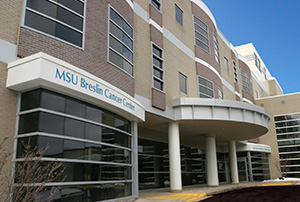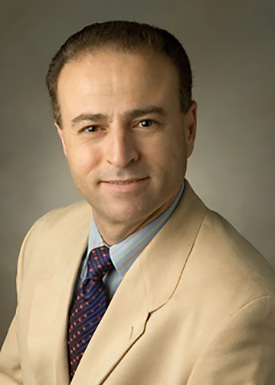Feb. 1, 2015:
A conversation with Anas Al-Janadi, MD, medical director of the Michigan State University Breslin Cancer Center, which is a member of the Big Ten Cancer Research Consortium.
Q: What does the Michigan State University College of Human Medicine Breslin Cancer Center’s membership in the Big Ten Cancer Research Consortium mean for the patients you and your colleagues serve?
Cancer is a devastating disease, and the fight against cancer can only be won by teaming up to fight this merciless enemy. Our patients now can have the cutting edge research that is expected to be created and launched by the consortium members. The diversity and unique strength of each institution will now come together in order to deliver on the promise to our patients who can now find the most promising clinical trials in their own community. The MSU Breslin Cancer Center always has and continues to partner with communities throughout the state. Through our membership in the Big Ten CRC, we can also extend the offerings of clinical trials to all of our partners.
Q: What impact does the MSU Breslin Cancer Center’s membership have on cancer clinical trials?
The community-based MSU Breslin Cancer Center is a full-service oncology care provider staffed by the faculty of the Division of Hematology and Oncology at Michigan State University. The university has a large, community-based College of Human Medicine comprising six campuses, so there are opportunities for participation in Big Ten CRC research in all regions of Michigan. Many of our researchers are deeply entrenched in precision medicine cancer research in various departments at the College of Human Medicine. MSU also includes colleges of Veterinary Medicine, Osteopathic Medicine, and Nursing, adding a diversity of researchers and creativity to the Big Ten CRC efforts.
Q: How does the MSU Breslin Cancer Center help the Big Ten CRC further its goals?
Community outreach is essential to successful clinical trials. The MSU Breslin Cancer Center is intimately connected to the various communities it serves. Patients’ participation in clinical trials is vital to enhance the success of this consortium. My colleagues are involved and invested in this endeavor by serving on various steering committees, and they will contribute to the design, creation, and conduct of the Big Ten clinical trials.
 Q: What kind of scientific advances at the MSU Breslin Cancer Center are changing the way you diagnose and treat cancer?
Q: What kind of scientific advances at the MSU Breslin Cancer Center are changing the way you diagnose and treat cancer?
Numerous cancer research activities and investigations are being conducted at MSU and the MSU Breslin Cancer Center to advance the methods by which we diagnose and effectively treat cancer. We have many studies underway, including into the translational aspects of breast tumor microenvironment; a xenograph model for drug screening, biomarker development, and personalized lung cancer treatment; evaluation of the MLK3 pathway in breast cancer and glioblastoma (GBM) progression; a combined microarray and gene expression profiling approach to understand cancer heterogeneity, progression, and resistance; the role of nanomedicine in breast cancer early detection, imaging, and the development of less toxic chemotherapies; the development of novel oral proteasome inhibitors with high activity against multiple myeloma cell lines; the use of reflexology techniques to alleviate fatigue symptoms; the evaluation of adherence to oral cancer chemotherapeutics; and the role of tyrosine kinase PTK6 in pancreatic cancer.
Q: How is the MSU Breslin Cancer Center’s membership in the Big Ten CRC different from your center’s other collaborative efforts?
The Big Ten Cancer Research Consortium offers a unique atmosphere to its members and focuses on close collaboration and communication between various leaders in the consortium. For example, cisplatin, one of the most effective chemotherapies against many cancers, was developed at MSU by the late Barnett Rosenberg, PhD, and the clinical development of cisplatin was done by Lawrence Einhorn, MD, at Indiana University. Another point that comes to mind is our effort to mentor and develop a cadre of young investigators through close guidance by the many nationally recognized members of this group. We are truly investing in the future and focusing on creating an atmosphere conducive to young researchers to be intimately involved in trials development, design, and execution.
About the Big Ten Cancer Research Consortium: The Big Ten Cancer Research Consortium creates a unique team-research culture to drive science rapidly from ideas to treatment-changing paradigms. Within this innovative environment, today’s research leaders collaborate with and mentor the research leaders of tomorrow with the unified goal of improving the lives of all patients with cancer.
About the Big Ten Conference: The Big Ten Conference is an association of world-class universities whose member institutions share a common mission of research, graduate, professional, and undergraduate teaching and public service. Founded in 1896, the Big Ten has sustained a comprehensive set of shared practices and policies that enforce the priority of academics in student-athletes’ lives and emphasize the values of integrity, fairness, and competitiveness. The broad-based athletic programs of the 14 Big Ten institutions provide nearly $200 million in direct financial aid to almost 9,500 student-athletes for more than 11,000 participation opportunities on 350 teams in 42 different sports. The Big Ten sponsors 28 official conference sports, 14 for men and 14 for women, including the addition of men’s and women’s lacrosse as official sports for the 2014-15 academic year. For more information, visit www.bigten.org.















Subscribe to the Big Ten CRC Newsletter X
X Facebook
Facebook YouTube
YouTube